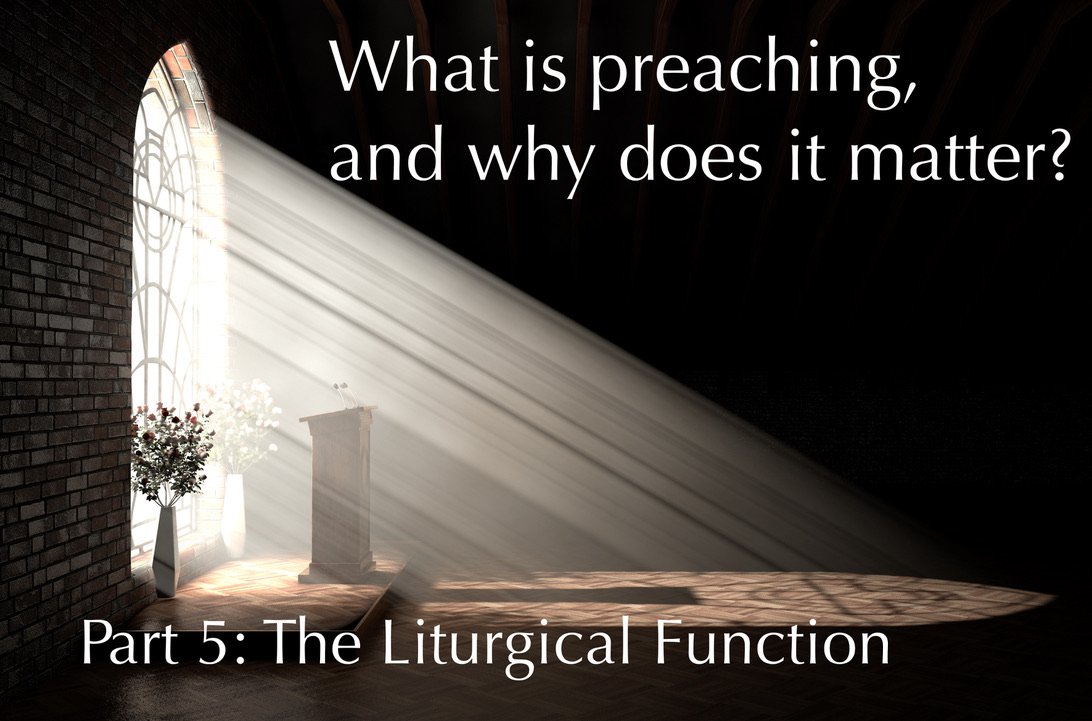
Preaching Exalts God
To proclaim God’s word is to call God’s people to worship. This doesn’t mean simply that worship is the most important application point in the sermon. It means that worship fuels every application point in the sermon. The ultimate and highest goal of preaching is that hearers walk away from the sermon filled with wonder, awe, and joyful delight in God. When this happens, all application becomes spontaneous response rather than dutiful obedience or moralistic burden.

The Application Question
No sermon is complete that does not apply the truth of the biblical text to life. No gospel-driven theological reflection is complete that does not ask the Application Question.
As we seek the gospel-driven path from text to sermon, we have so far explored three questions. The fourth and final question provides a fitting culmination of all of these by applying the message in light of the gospel as well as the biblical metanarrative: How does this text invite us into God’s Story?

The Redemption Question
If we preach an entire sermon and never mention the Christ, can we claim that it is a Christian sermon? I have come to a firm conviction that our preaching should always, ultimately, be about Jesus. Surprisingly, this conviction is not necessarily shared by all Christian preachers.

The Brokenness Question
As preachers, whether our objective is to evangelize the lost, to encourage the struggling, to comfort the suffering, or to disciple the growing, the path towards an experience of the gospel will always pass through an awareness of our own brokenness. Most often, this is where it will begin.

The Story Question
I have sought to make a case for “Big Story” preaching. If we are to make disciples who are faithful to the gospel in today’s world, we should lay the foundations of identity, worldview, mission and community by weaving the biblical metanarrative into everything we do. For us preachers, this begins with deliberately including in our sermon process a moment to expand the “story around the text” to include the entire Canon.

Gospel-Driven Theological Reflection
One of the greatest challenges of biblical preaching is blazing the trail from the ancient text to the contemporary world. Once you have diligently studied the historical and literary context, examined and analyzed the text itself, verified and amplified your thinking through some good research and come to some solid exegetical conclusions about what the text meant, how do you take the next step to determine what the text means for your particular group of hearers?

Foundation: Story
At the foundation of any culture is a shared narrative. The story of God and his people that we have received in the Scriptures is, without question, the narrative upon which the culture of the church must stand. This story encompasses all human existence, from our pre-history to our final destiny. It offers a comprehensive and absolute way of understanding ourselves, the world, and ourselves in the world.

Preaching on Money, Part 3
When you calculate assets and liabilities, money in your pocket always belongs in the “asset” column, right? According to an accountant friend of mine, this is actually not always the case. The technical term for money that is a liability is “unearned asset.” When a person or business receives payment for services that they have not yet rendered, those funds must be counted as a liability.
A “big story” sermon series first asks the question, “What is God’s purpose?” The next question is, “How has sin mucked it up?” God has given us money as an asset. Sin has made it a liability.

Preaching on Money, Part 2
Preaching a “Big Story” series on money will naturally begin with God’s purpose for our relationship to the material world. Once we understand this, we are more prepared to understand how this relationship has been affected by sin, and how Christ has redeemed it. Here is a list of texts and ideas that could help us tell the story of money.

Preaching on Money, Part I
As a young pastor, I was reluctant to preach about money. At the time, however, I knew several older preachers who relished any opportunity to tackle the subject. I wondered why this was so. Did they just not care who they offended? Were they jaded to the financial demands on their hearers? Did they just not know that they ran the risk of feeding the “money-grabbing-preacher” stereotype that already existed in peoples’ minds?
Now that I’m an older preacher, I think I understand. The longer I live, the more I realize that the only thing that really matters in my ministry is to make disciples. And the longer I try to make disciples, the more clear it becomes that how we use our money is the truest measure of our discipleship, because it reveals where our treasure really is.

Planning a Topical Sermon Series
Many preachers who share my conviction that the best preaching is “expository preaching” would also say that “expository preaching” requires that every sermon series be a meticulous verse-by-verse walk through a book of the Bible. Certainly there is great value and rich rewards in this kind of preaching ministry. However, you may at least occasionally (and perhaps quite often) feel you need to preach a series of sermons on a particular topic. Is it possible to be an expository preacher without limiting yourself to expository sermon series? I believe it is, but how you approach the planning of your topical series is important.

Towards A “Big Story” Homiletic
How do we go about intentionally establishing a ministry of “big story preaching?” We need a “big story homiletic” that could secure a metanarrative thread in every sermon. Such a homiletic will need to weave the big story into its theology, its hermeneutic, its cultural engagement, and its application of the text.

What does the “Big Story” Do?
We are all shaped by a story. The question is, which story will it be? For disciples of Jesus, this life-shaping story is the Gospel. Before we turn to specifics of how to integrate the “big story” into our preaching, we should ask another question: What are the goals of Big Story Preaching?
How do we expect the grand narrative of the Scriptures to form disciples of Jesus? I will focus on four ways: The big story defines identity, shapes worldview, informs and guides mission, and creates community.

“Big Story” Preaching: Making Disciples in a Post-Christian World
How do we make disciples in a post-Christian world?” I am convinced that the answer must begin with the story we tell. I’m not talking about merely “telling stories,” that people like to hear. We must tell the story — the grand narrative of the Scriptures that shapes our view of the world, of ourselves, and of history. Why? Because the single most important factor for forming identity, character, and purpose is how we answer the question, “In what story am I living?”

